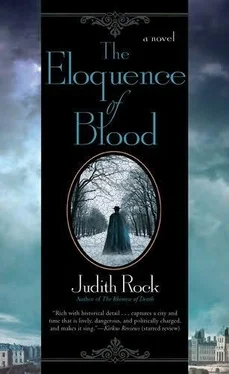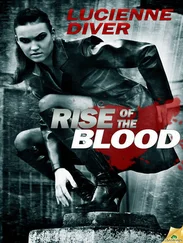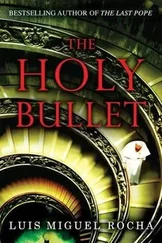Judith Rock - The Eloquence of Blood
Здесь есть возможность читать онлайн «Judith Rock - The Eloquence of Blood» весь текст электронной книги совершенно бесплатно (целиком полную версию без сокращений). В некоторых случаях можно слушать аудио, скачать через торрент в формате fb2 и присутствует краткое содержание. Жанр: Исторический детектив, на английском языке. Описание произведения, (предисловие) а так же отзывы посетителей доступны на портале библиотеки ЛибКат.
- Название:The Eloquence of Blood
- Автор:
- Жанр:
- Год:неизвестен
- ISBN:нет данных
- Рейтинг книги:5 / 5. Голосов: 1
-
Избранное:Добавить в избранное
- Отзывы:
-
Ваша оценка:
- 100
- 1
- 2
- 3
- 4
- 5
The Eloquence of Blood: краткое содержание, описание и аннотация
Предлагаем к чтению аннотацию, описание, краткое содержание или предисловие (зависит от того, что написал сам автор книги «The Eloquence of Blood»). Если вы не нашли необходимую информацию о книге — напишите в комментариях, мы постараемся отыскать её.
The Eloquence of Blood — читать онлайн бесплатно полную книгу (весь текст) целиком
Ниже представлен текст книги, разбитый по страницам. Система сохранения места последней прочитанной страницы, позволяет с удобством читать онлайн бесплатно книгу «The Eloquence of Blood», без необходимости каждый раз заново искать на чём Вы остановились. Поставьте закладку, и сможете в любой момент перейти на страницу, на которой закончили чтение.
Интервал:
Закладка:
No one spoke, and the only sound was the crackling fire.
“Come,” Isabel Brion said briskly. She pulled her friend to her feet. “Let me get my cloak and we will go and search one more time. Two are always better than one.” She smiled at the dancing master. “And perhaps Monsieur Morel will be so kind as to escort us to your house? It is barely a step, Monsieur Morel, just to the Place Maubert, at the Sign of the Rose.”
“I am entirely at your service, mesdemoiselles!” Morel grabbed his hat from the chest and stowed the little violin in a deep pocket inside his wide-skirted coat.
Charles said he would walk as far as the Place with them, and Callot made as if to come, too, but his great-niece firmly refused him and he wandered sadly back to his bottle.
The little party went out into the thin sunshine, the two girls walking arm in arm and talking earnestly. Once, Martine Mynette laughed and looked archly at Morel, and Isabel Brion blushed crimson. Morel walked beside Isabel, studiously seeing and hearing nothing. Charles was silent, admiring the Mynette girl’s teasing attention to her friend’s romance, even as she herself faced disaster. His heart ached for the grieving girl, and he hoped that she had proof that she was the orphan of legitimately married and respectable parents, which she surely was, since Mademoiselle Anne Mynette had adopted her as her heir. And since Henri Brion wanted her as a wife for his son. People made an inflexible distinction between the orphans of respectable married parents and those nameless foundlings left on the street. The children were received in different institutions and faced vastly different fates. The best a foundling could hope for was to be taken in and raised as a servant, or sometimes as a future apprentice. Without the donation, and if she couldn’t prove her parentage to strangers, Martine would have very little chance of a good marriage. Her future could well be bleak indeed, if she went on resisting her guardian and his unexciting son.
When the little party reached the Mynette house at the Sign of the Rose, a substantial stone house with gates in a stone arch protecting its cobbled court, Charles made his polite farewells. But he was frowning as he started back across the Place to the chandler’s shop. How could a notary-and a guardian-lose track of such an important document?
Chapter 3
The early darkness had fallen. The long chamber in Louis le Grand above the older pensionnaires’ refectory, called the salle des actes, was full of laughing professors and lay brothers crowded shoulder to shoulder on benches. On the small stage at the chamber’s east end, A Farce of Monks, this year’s strictly in-house comedy, was galloping to its conclusion. These private, Jesuits-only farces were a Christmas tradition in the Society of Jesus, a wise chance to poke fun at each other, puncture overblown solemnities, and generally let off steam. From the stage, Charles saw that even the college rector was smiling, something he’d rarely done in recent months. Maitre Richaud, on the other hand, sitting farther back in the crowd, looked as though devils with pitchforks were prodding him from every side.
Charles, playing Brother Infirmarian, was waving a clyster-an outsize enema syringe-at a bug-eyed patient.
“But mon pere,” Charles caroled, “it is for your own good!”
“No, no, I beg you!” The patient keeping his back to the wall and his eyes on the clyster was the college’s real infirmarian, the lay brother Frere Brunet. “I tell you I am well,” he gabbled at Charles, “it is a miracle, there is no need for your medicines.”
“They are often like this when they see my clyster,” Charles said cheerfully over his shoulder to the audience. “But, never fear, this will clear his head as well as his bowels!”
The audience roared and wiped its streaming eyes on sleeves and cassock skirts so as not to miss anything onstage. Charles pounced on his patient. Brunet yelped, picked up the skirts of his brown monk’s habit, and fled through a doorway in the scenery. Charles followed, and the shouts and pleas from offstage convulsed the audience anew. He came back dancing an intricate little gigue of triumph and tossed the empty clyster aside. Brunet popped out of the exit and lumbered downstage to address the audience.
“Mes freres, I have a grudge to state, a bone to pick! This gigue-hopping brother is a mere scholastic, is he not?”
Knowing what was coming, the audience called back, “The merest of scholastics, yes!”
Brunet nodded soberly. “And the end of a scholastic is…?”
“To be kicked!” the audience roared, and Brunet proceeded to follow their instructions.
Charles picked himself up from an elaborate fall and bowed deeply to Brunet while rubbing his posterior and grimacing at the audience. Then the two of them opened the door of a large cupboard standing onstage, revealing a tall wooden barrel.
“How do you fare, Brother Cellarer?” Charles shouted, addressing himself to the pair of square-toed black shoes sticking up from the barrel. He turned to the audience. “What do you think, mes peres et mes freres? If Brother Cellarer promises never to water our wine again, shall we pull him out?”
Shouts of “Yes!” and “No!” drowned each other.
“Come and help me, then!”
That was the cue for a half dozen Jesuits to leap onto the stage. They pulled the red-faced and realistically dripping mathematics professor playing Brother Cellarer out of the barrel and set him on his feet. He swore by Bacchus, classical god of the grape, never to so much as mention water in the same breath with wine, and everyone onstage joined in what began as a gigue and ended as a hilarious rout. Pere Montville, former assistant rector and now the newly appointed college principal, provided the accompaniment, sawing joyously on a squawking violin.
Then Pere Damiot, the farce’s beaming author, walked downstage to speak the verse epilogue. His rich voice filled the chamber and the audience quieted to listen.
Now, Fathers and Brothers, a mirror we’ve held to the high and the low, what was hidden’s revealed. Now nothing’s concealed. Let’s give thanks for the season, for laughter and reason, for our house and each other, both Fathers and Brothers!
There was long applause and more laughter, and then lay brothers began clearing away the benches and setting out jugs of wine and trays of refreshments along one side of the chamber. The cast and Damiot left by the door through which Charles had chased Frere Brunet and shed the brown monks’ robes they’d worn over their Jesuit cassocks.
Straight-faced, Charles said to Damiot, “Think they liked it at all?”
“No. They were only laughing at your left-footed dancing.”
They grinned at each other and went back to the noisy chamber in search of wine and food. Carrying cone-shaped glasses and small sweet cakes shaped like the animals at the Christmas manger, they made their way through a barrage of teasing and compliments to a relatively quiet corner.
“To your immortal prose,” Charles said, raising his glass to Damiot.
“To your two left feet,” Damiot replied.
They drank and looked sadly at the pale reddish wine in their glasses.
“Watered,” Charles said.
“Very. But I suppose we’re lucky it’s not straight river water.”
Charles drank again. The stuff was, at least, discernibly wine. “Why do you suppose our finances are suddenly so bad?”
“Cash is scarce.” Damiot tended to know these things, because his father was a wealthy merchant goldsmith. “All those fleeing Huguenots have drained us of so much money and skill. I continually ask myself how heretics can be such good businessmen.” He shrugged. “Even gold itself is scarce. Silver, too.”
Читать дальшеИнтервал:
Закладка:
Похожие книги на «The Eloquence of Blood»
Представляем Вашему вниманию похожие книги на «The Eloquence of Blood» списком для выбора. Мы отобрали схожую по названию и смыслу литературу в надежде предоставить читателям больше вариантов отыскать новые, интересные, ещё непрочитанные произведения.
Обсуждение, отзывы о книге «The Eloquence of Blood» и просто собственные мнения читателей. Оставьте ваши комментарии, напишите, что Вы думаете о произведении, его смысле или главных героях. Укажите что конкретно понравилось, а что нет, и почему Вы так считаете.












